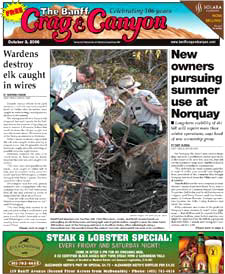
3 October 2006
Wardens Destroy Elk Caught in Wires
| |

Banff Park Wardens Joe Owchar, left, Chris Worobets, centre, and
Birch Howard work on untangling an elk from some old telegraph wire it got its antlers caught in near the train tracks 200 metres west
of the Norquay entrance to Banff on Friday. After subduing it using a tranquilizer dart the wardens freed the animal, but later
destroyed it because of its condition.
|
Banff Alberta - Despite rescue efforts from park wardens, a
bull elk was euthanized in Banff on Friday after its antlers were caught in some wiring, causing serious distress to the animal.
The wiring was left over from an old telegraph line and Canada Pacific Railway was in the process of figuring out how to remove it.
However, before that could be done, the elk got caught in it near the tracks about 200 metres west of the Norquay entrance to the town.
Parks Canada received a report that the elk was caught in the wiring at around noon, but it's possible that it had been caught since the
morning, or possibly even the night before.
Wardens snipped the wire so it could move its head and lie down, however the wire was still caught in its antlers.
"The wire that runs parallel to the tracks... was caught on either side of him, and he couldn't really move his head," said
Jesse Whittington, a wildlife biologist with Parks Canada. The wire caused the elk to thrash.
Whittington was the only person trained to use a tranquilizer who was available that day. He had been in the field all day and arrived
on scene to tranquilize the elk at about 5 p.m.
"I was the only one that has immobilization experience that was on call," said Whittington.
"The first thing they wanted to do was just get it so that it could move and lie down and rest, because up to that point it really
hadn't been able to rest," said Whittington, who was accompanied by three wardens and a foreman from CP Rail.
It took about 10 minutes for the elk to succumb to the anesthetic and about another 10 minutes to remove the wiring.
Whittington and the other wardens monitored the elk's heart rate and temperature. However it would not stand up.
"His breathing was a little faster than usual, but it wasn't anything to be alarmed over," Whittington said. "He seemed
to be coming out of the anesthetics. He had some head movement and some leg movement. I think he was just too exhausted to move."
A warden and the CPR foreman stayed with the animal until 10 p.m., and returned Saturday morning only to discover that the elk was lying
in the exact same position. It wasn't responding to external stimuli.
After consulting with a veterinarian they discovered that the elk likely would die anyway.
"One thing that happens with animals when they've exerted themselves really hard for a long period of time, they build up lots of
lactic acid in their muscles, and then their muscles can start to break down after, and this is especially problematic in hoofed animals
like elk and deer.
"The muscles break down, they release myoglobin... (which) binds oxygen and that's released into the bloodstream and has toxic
components. It breaks down and it can damage the kidneys."
This kidney failure could ultimately cause animals to die a day later, or up to a few weeks later, said Whittington.
The only possible treatment is to give lots of intravenous fluids, a practice that would be extremely impractical for an animal as large
as an elk.
"It was very unlikely that it could recover," said Whittington, and a decision was made to euthanize the elk.
"There's nothing we could have done differently for this animal," said Whittington.
Ed Greenberg, spokesperson for CPR, said the company will continue to work to remove the old telegraph wire.
"It's a CPR wire. It's on our property," said Greenberg. "It was used for telegraph purposes and we're in the process of
putting a plan together to remove it when this happened. We were just finalizing the plans to remove the wire and then unfortunately
this situation happened."
To his knowledge, Greenberg said this was the first time an incident such as this has occurred along the CPR tracks.
"It's a very unfortunate situation, but I know that (CPR employees) were quite concerned and tried to assist Parks Canada where
they could," Greenberg said.
While the death of this mature elk is not going to endanger the elk population, it is nonetheless a tragic loss.
"We don't like to lose any animals to human-related causes," said Whittington.
Banff field unit spokesperson Marjorie Huculak said the decision to remove any animal from the ecosystem is taken seriously, is
considered a last resort and only made once a team of experts is consulted.
|